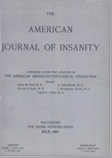PERSONALITY FACTORS IN PATIENTS WITH MUSCULAR DISABILITY
Abstract
In 67 patients with diseases involving the muscles the anatomical involvement, bio-chemical findings and personality factors were investigated. Many cases presented problems in diagnosis between structural disease of the nervous or muscular systems and psychoneurotic reactions. Emotional changes often were accompanied by altered performance of the muscles. When the symptomatology was more severe than could be explained satisfactorily by the physical studies, the psychopathological findings were demonstrated to be of importance in the development of the clinical picture. In some instances an original diagnosis of muscle disease was shown to be erroneous by proof that a psychoneurosis existed and the symptoms could be improved by psychotherapy. The type of adjustment in those with muscle disease depended on a complexity of factors, such as the personality prior to the illness, the age of onset and the type and the course of the disability. Suggestion played an important part in the symptomatic change after administration of various medications. Study of both the physical and personality factors was found to be of value in the diagnosis and treatment of muscle disease.
Access content
To read the fulltext, please use one of the options below to sign in or purchase access.- Personal login
- Institutional Login
- Sign in via OpenAthens
- Register for access
-
Please login/register if you wish to pair your device and check access availability.
Not a subscriber?
PsychiatryOnline subscription options offer access to the DSM-5 library, books, journals, CME, and patient resources. This all-in-one virtual library provides psychiatrists and mental health professionals with key resources for diagnosis, treatment, research, and professional development.
Need more help? PsychiatryOnline Customer Service may be reached by emailing [email protected] or by calling 800-368-5777 (in the U.S.) or 703-907-7322 (outside the U.S.).



